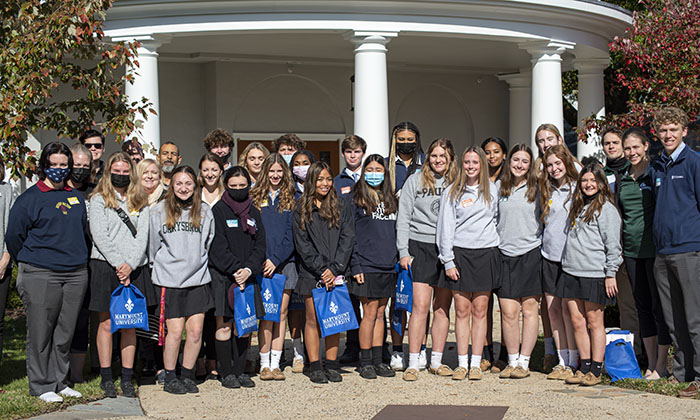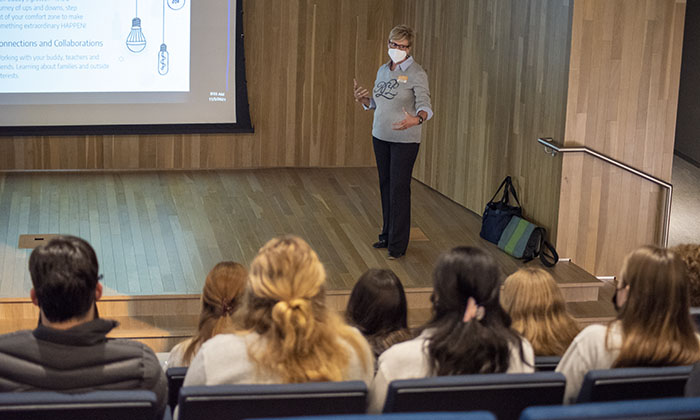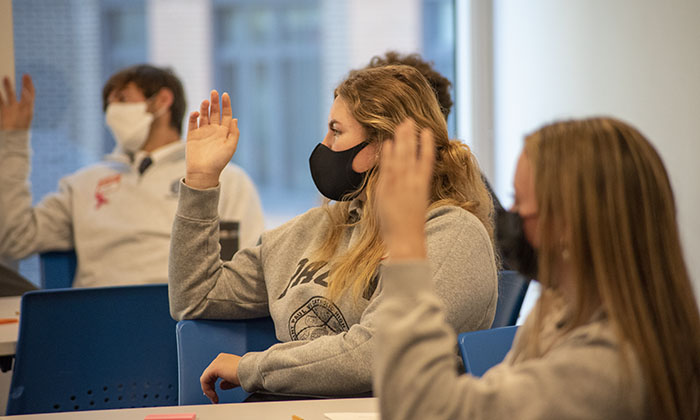On November 5, more than 30 high school students gathered at Marymount University’s Ballston Center for a day of training at the third annual Peer Mentor Leadership Institute.
The Institute began in 2019 as an idea to provide a high level of instruction and collaboration among students who have chosen to become peer mentors at Catholic schools in the Diocese of Arlington.
Diane Elliott, Assistant Superintendent of the Office of Catholic Schools, and a dynamic team of high school mentor coordinators and teachers from local diocese high schools turned to Dr. Clara Hauth, Associate Professor of Education at Marymount, to support the program, and together they launched the Peer Mentor Leadership Institute.
“We welcome a group of some of the top peer mentors to join the Institute and increase their knowledge and skills,” Dr. Hauth said. “Marymount faculty and graduate students engage the high schoolers in a day of workshops and activities, building their foundation as leaders ready to share what they’ve learned with fellow mentors at their school.”
The Peer Mentor program is designed to foster inclusive learning for students with intellectual and developmental disabilities, and has been implemented at four Catholic high schools within the Diocese — Bishop Ireton High School, Bishop O’Connell High School, St. Paul VI High School and Saint John Paul the Great High School.
“Peer mentoring is a unique model in the Diocese of Arlington where students take on a position, almost like a teacher assistant, in the classroom and they’re there to support a student’s social-emotional needs,” explained J-Lynn Van Pelt, Director of Special Services at Bishop Ireton High School. “Peer mentors make sure our neurodiverse students can integrate into the classroom, be included with their peers and are really there for the students to help guide them.”
This year, student workshops focused on social-emotional coaching, understanding ableism and building allyship. Leading the workshops were Marymount faculty members, including Dr. Marcia Baldanza, Assistant Professor of Education; Dr. Nicole Conners, Adjunct Professor of Education; and Dr. Nicci Dowd, Assistant Professor of Education. Professors were assisted in lesson planning and classroom teaching by a team of graduate Education students including Zain Hassan, Zakiah Alasiri, Jennifer Thompson and Samantha Fry.
“We learned more about how we can de-escalate a difficult situation and help calm our peer student,” explained Emily Dubois, a senior at St. Paul VI High School. “We also learned how to be the best ally to them by not speaking for them and allowing them to speak for themselves, so it benefits them the most.”
This is the second year Dubois has participated in the Institute. Her initial interest in the Peer Mentor program was sparked from a personal connection.
“I started peer mentoring because I have a little sister with Down syndrome. She inspired me to become a peer mentor and once I started, I fell in love with the students in our program at school,” Dubois said. “I’ve become involved with them and created friendships, so I want to help them the best that I can.”
Her experience at the Institute has only affirmed her plans to study special education after graduating from high school in the hopes of becoming a teacher.
“The peer mentoring program at my school, as well as attending the Institute, has helped me not only realize this is what I’d like to pursue, but also the type of person I’d like to be while doing it,” Dubois added.
“The Holy Spirit is pushing us all to be accepting of everyone, and these students have been greatly impacted,” Elliott said. “We have a wonderful group of students, and the Peer Mentor Leadership Institute shows how our students are mature beyond their years. We’re very grateful to Marymount for providing a wonderful educational opportunity for the students and teachers.”
In addition to lessons aimed at student peer mentors, teachers and administrators at participating high schools received instruction on creating a trauma-sensitive learning environment by Dr. Paula Azevedo, Assistant Professor of Education.
This year’s efforts were supported by Dr. Jessica Marotta, Assistant Professor of Education, who worked together with the team to bring the events of the day together, including a tour of Marymount’s main campus for all students and teachers.
Moving forward, the Institute aims to recruit additional peer mentors and build connections between students and the University’s range of academic programs.







